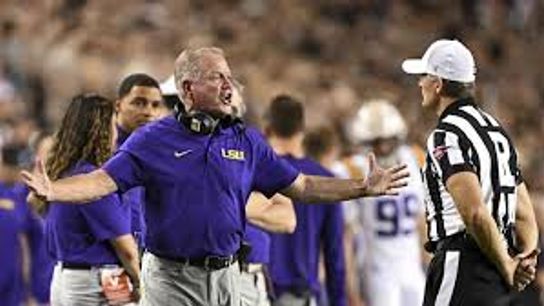Like most every Southeastern Conference school, LSU has been plenty active in recent years in the Name, Image and Likeness marketplace.
Tigers coach Brian Kelly, who signed a 10-year contract with LSU when he exited from Notre Dame following the 2021 regular season, says the absence of clearly defined contracts for student-athletes and the lack of adoption to the proposed revenue-sharing model for collegiate athletes prevents teams from having much in the way of protecting their rosters in-season.
The subject is the overarching topic today in college athletics, specifically football, following the decision of UNLV quarterback Matthew Sluka to voluntarily redshirt this season due to what the Sluka family says is unfulfilled monetary NIL promises from UNLV.
“Well, you really don’t [have any protections]. The NIL, because it becomes a third-party piece, you lose control," Kelly said Wednesday morning on the SEC's weekly teleconference with its coaches. "That’s why the revenue-sharing piece is so important and getting that legislation passed now puts that back through the universities."
Kelly believes the onset of revenue-sharing -- which projects to begin at approximately $22 million and could be in place as early as summer 2025 -- could shift structure back into collegiate athletics departments and help avoid or drastically minimize the potential for third-party interference.
"Now, those contracts can be written a lot differently (with revenue-sharing in place)," Kelly said. "When you’re dealing with a third party and collectives and NILs, the universities are at arm’s length.
"It’s much more difficult to put into the kind of language necessary to see that maybe a quarterback doesn’t leave halfway through a season or a guy doesn’t opt-out for a particular bowl game. Revenue-sharing changes the dynamics. Now, I’m not saying it guarantees all those things go away. But, it does run that revenue through the universities and contractually now you’re at a better position to put forth the language necessary to see that maybe some of those things are more difficult."
Kelly says LSU takes time during recruits' visits to campus to educate them and their families on how to navigate these murky waters, suggesting they only ever deal with licensed agents and never sign away total control of their intellectual properties.
"Unfortunately, those stories do exist and I think there’s a couple of things that when we have young men come to our campus, we do spend some time with them and the first thing is, you should never give up your name, your image and likeness, exclusively; you should hold on to that," Kelly said. "I think that’s the first thing.
"I think the second thing is anytime we’re talking to the young men, we want to make sure that when we talk about agents that they’re certified. I know that’s difficult in most instances, but a certified agent versus somebody that does it as a part-time job, those should be red flags for families and they should be very, very cautious relative to signing anything if they are not a certified agent or they want your name, image and likeness. That, to me, are the kind of things that we try to educate when we have the young men on our campus."
